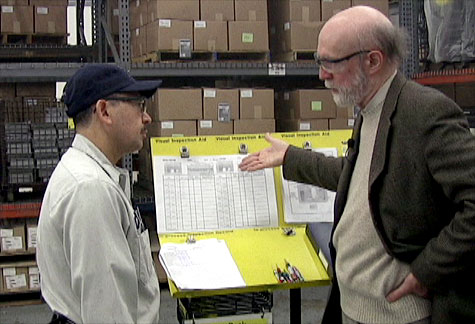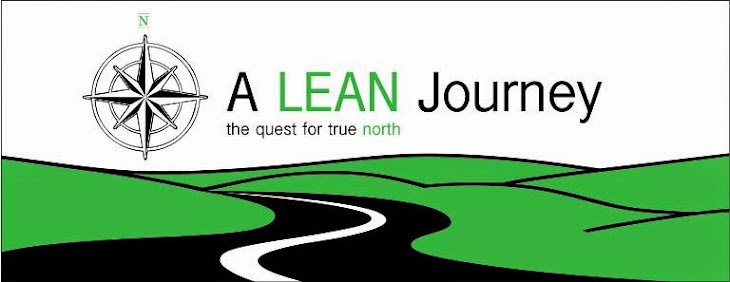 |
| http://money.cnn.com/ |
A
Lean implementation can not be sustained without Lean management. Our
management system must change as our production system changes in Lean to
maintain the integrity of technical changes over time. A Lean management system
comprises of the practices and tools used to monitor, measure, and sustain the
operation of Lean production operations. Lean management practices identify
where actual performance fails to meet expected performance; assigns and
follows up improvement activities to bring actual in line with the expected, or
to raise the level of performance.
Lean implementation can not be sustained without Lean management. Our
management system must change as our production system changes in Lean to
maintain the integrity of technical changes over time. A Lean management system
comprises of the practices and tools used to monitor, measure, and sustain the
operation of Lean production operations. Lean management practices identify
where actual performance fails to meet expected performance; assigns and
follows up improvement activities to bring actual in line with the expected, or
to raise the level of performance.
Management
must go to the Gemba to practice Lean management. The word ‘Gemba’ is a
Japanese word that means the real or actual place. Gemba Walks can be
summarized by:
must go to the Gemba to practice Lean management. The word ‘Gemba’ is a
Japanese word that means the real or actual place. Gemba Walks can be
summarized by:
Go
to the actual place.
to the actual place.
Get
the facts about the actual thing or activity.
the facts about the actual thing or activity.
Grasp
the entire situation.
the entire situation.
Generate
reasons that explain what is happening.
reasons that explain what is happening.
Guide
corrective actions or countermeasures.
corrective actions or countermeasures.
The
purpose of walking the actual place or Gemba is help identify problems,
non-value added activities, or wastes through a deliberate observation of a
particular area or process.
purpose of walking the actual place or Gemba is help identify problems,
non-value added activities, or wastes through a deliberate observation of a
particular area or process.
All
too often, attempts are made to solve problems without knowing anything about
or are not being familiar with a particular area or process — resulting in a
misdiagnosis or failed solution. Answers come from the floor, from the Gemba,
where the condition occurs. You need to go to the real place and experience
these conditions for yourself before being able to take the next steps.
too often, attempts are made to solve problems without knowing anything about
or are not being familiar with a particular area or process — resulting in a
misdiagnosis or failed solution. Answers come from the floor, from the Gemba,
where the condition occurs. You need to go to the real place and experience
these conditions for yourself before being able to take the next steps.
Gemba
walks are not to be confused with management by walking around (MBWA). The
primary purpose of Gemba walking is to teach. When you are the Gemba walker, you are
playing the role of sensei (mentor, coach, teacher). The role of the
sensei is to ask questions, introduce new tools and approaches, stimulate new
thinking, teach, and (sparingly) to give advice.
walks are not to be confused with management by walking around (MBWA). The
primary purpose of Gemba walking is to teach. When you are the Gemba walker, you are
playing the role of sensei (mentor, coach, teacher). The role of the
sensei is to ask questions, introduce new tools and approaches, stimulate new
thinking, teach, and (sparingly) to give advice.
Manager
should be out in Gemba regularly. They should spend a big chunk of their day
out on the shop floor. Gemba walking teaches us to see in new ways what we have
failed to see before. So what do you look for and how do you see it? All
management should learn to ask these three simple questions:
should be out in Gemba regularly. They should spend a big chunk of their day
out on the shop floor. Gemba walking teaches us to see in new ways what we have
failed to see before. So what do you look for and how do you see it? All
management should learn to ask these three simple questions:
1) What is the process?
2) How can you tell it is working?
3) What are you doing to improve it (if
it is working)?
it is working)?
Nothing
sustains itself, certainly not Lean manufacturing or Lean management. So,
establish and stick to a routine including regular visits to the Gemba, check
the status of visual controls, follow-up on daily accountability assignments,
and ask the three simple questions everywhere. Gemba walks are really the check
in our PDCA methodology of continuous improvement. Lean management is, as much
as anything, a way of thinking. Keep learning, thinking, and teaching in the
Gemba.
sustains itself, certainly not Lean manufacturing or Lean management. So,
establish and stick to a routine including regular visits to the Gemba, check
the status of visual controls, follow-up on daily accountability assignments,
and ask the three simple questions everywhere. Gemba walks are really the check
in our PDCA methodology of continuous improvement. Lean management is, as much
as anything, a way of thinking. Keep learning, thinking, and teaching in the
Gemba.
 A Lean Journey
A Lean Journey 




Leave a Comment
Your email address will not be published. Required fields are marked with *